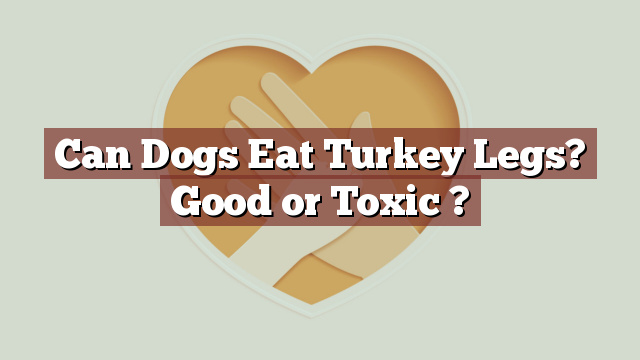Can Dogs Eat Turkey Legs? Good or Toxic?
As responsible pet owners, it is important to be knowledgeable about the foods that are safe for our furry friends to consume. This ensures their well-being and helps prevent any potential health issues. In this article, we will explore whether dogs can eat turkey legs and whether they are good or toxic for them.
Nutritional Value of Turkey Legs for Dogs
Turkey legs are a popular food item in many households, especially during festive occasions. They are known for their rich flavors and meaty texture. When it comes to the nutritional value of turkey legs for dogs, they do provide some benefits. Turkey meat is a good source of protein, which is an essential nutrient for dogs. It helps in building and repairing tissues, promoting a healthy coat, and supporting a strong immune system.
Additionally, turkey legs contain vitamins and minerals such as vitamin B6, niacin, phosphorus, and selenium. These nutrients play a crucial role in maintaining overall canine health.
Are Turkey Legs Safe or Toxic for Dogs?
No, turkey legs are not safe for dogs to eat. While turkey meat itself can be a healthy addition to a dog’s diet when prepared properly, the bones in turkey legs pose significant risks. Cooked turkey bones can splinter and potentially injure a dog’s mouth, throat, or digestive tract. They may cause choking hazards, blockages, or even puncture internal organs.
It is essential to note that even if the turkey leg is raw, it is still not recommended to feed it to your dog. Raw meat carries a higher risk of bacterial contamination, such as salmonella or E. coli, which can lead to severe illness in dogs.
Veterinarians strongly advise against feeding turkey legs to dogs due to these potential dangers.
Potential Risks and Benefits of Feeding Turkey Legs to Dogs
Feeding turkey legs to dogs can have severe consequences and risks. As mentioned earlier, the bones in turkey legs can splinter and cause serious injuries. Ingesting these fragments can lead to a range of complications, including choking, intestinal blockages, or even perforation of the digestive tract.
On the other hand, the high-fat content in turkey legs can also pose health risks to dogs. Consumption of large amounts of fatty foods can lead to pancreatitis, a potentially life-threatening condition.
While turkey meat itself can be beneficial for dogs, it is important to opt for boneless and skinless turkey breast or lean cuts instead.
What to Do if Your Dog Eats a Turkey Leg?
If you suspect that your dog has ingested a turkey leg, it is crucial to take prompt action. Contact your veterinarian immediately, regardless of whether the turkey leg was raw or cooked. The veterinarian will provide guidance based on your dog’s size, the amount consumed, and any symptoms your dog may be experiencing.
Conclusion: Can Dogs Eat Turkey Legs?
In conclusion, dogs cannot eat turkey legs as they pose serious risks to their health. The bones in turkey legs can cause injuries and blockages, while the high-fat content can lead to pancreatitis. It is essential to prioritize your dog’s well-being and provide them with a balanced and safe diet.
Instead of feeding your dog turkey legs, consider offering them boneless and skinless turkey breast in moderation. As always, it is best to consult with your veterinarian for specific dietary recommendations for your furry companion.
Thank you for investing your time in exploring [page_title] on Can-Eat.org. Our goal is to provide readers like you with thorough and reliable information about various dietary topics. Each article, including [page_title], stems from diligent research and a passion for understanding the nuances of our food choices. We believe that knowledge is a vital step towards making informed and healthy decisions. However, while "[page_title]" sheds light on its specific topic, it's crucial to remember that everyone's body reacts differently to foods and dietary changes. What might be beneficial for one person could have different effects on another. Before you consider integrating suggestions or insights from "[page_title]" into your diet, it's always wise to consult with a nutritionist or healthcare professional. Their specialized knowledge ensures that you're making choices best suited to your individual health needs. As you navigate [page_title], be mindful of potential allergies, intolerances, or unique dietary requirements you may have. No singular article can capture the vast diversity of human health, and individualized guidance is invaluable. The content provided in [page_title] serves as a general guide. It is not, by any means, a substitute for personalized medical or nutritional advice. Your health should always be the top priority, and professional guidance is the best path forward. In your journey towards a balanced and nutritious lifestyle, we hope that [page_title] serves as a helpful stepping stone. Remember, informed decisions lead to healthier outcomes. Thank you for trusting Can-Eat.org. Continue exploring, learning, and prioritizing your health. Cheers to a well-informed and healthier future!

